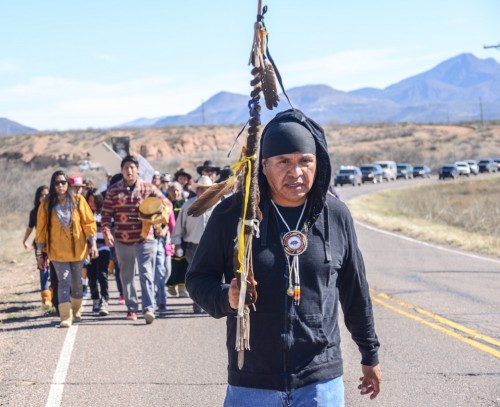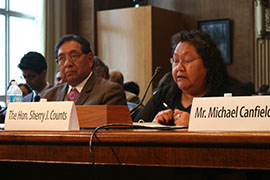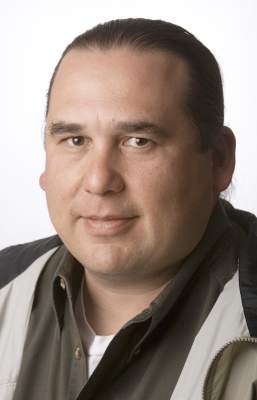
Apache Stronghold Convoy nears DC for repeal of law desecrating Oak Flat for copper mining
By Brenda Norrell, The Narcosphere
The Apache Stronghold Convoy visited the graves of the children who never came home at Carlisle Indian School in Pennsylvania, remembering the Chiricahua Apache children who were held as prisoners of war.
“We need to know our history, where we have been will guide us to where we are going. ” said Wendsler Nosie Sr., Apache.
“The Apache Stronghold visited our relatives who never made it back home. It was a real emotional experience for all of us. The Chiricahua Apache children who were there did not arrive as students like other tribes, but arrived as Prisoners of War,” Nosie said after being present at the Carlisle Indian School cemetery.
The Apache Stronghold Convoy is enroute to Washington DC to demand repeal of the law which would desecrate the Apaches sacred Oak Flat with copper mining, which Sen. John McCain sneaked into the defense bill.
The Apache Stronghold will be in New York Times Square at noon today, Friday, July 17. It will be in DC on July 21 and 22 for a spiritual gathering. In DC, Ariz. Congressmen Raul Grijalva and others will join the Apache Stronghold to urge repeal of the law.
The San Carlos Apache Nation said, “Stops have been made in Denver, where Neil Young offered the pre-opening show to the Apache Stronghold. Other spiritual prayers were also provided by members of the Sioux Nations in South Dakota when stops were made at the Crazy Horse Memorial and at Wounded Knee. Radio, TV and newspaper interviews followed in various cities. The convoy continued into Minneapolis, MINN and Chicago, and were graciously greeted by those in support of the repeal of the land exchange.”
“The spiritual journey of the Apache Stronghold caravan led by Wendsler Nosie, Sr., former Tribal Chairman and now the Peridot District Council for the San Carlos Apache Tribe, first stopped at the Gila River and Salt River Indian communities for spiritual prayers.”
“On the Navajo Nation, they met with spiritual leaders. After stopping at the Jicarilla Apache Reservation in Dulce, N.M., members of the Tribal Council unanimously passed a Tribal Resolution in support of the H.R. 2811, a bill introduced by Arizona Representative, Raul Grijalva to stop the implementation of Section 3003 of the National Defense Authorization Act which was passed last December 2014, that allows federal land at Oak Flat to be given to a foreign mining giant, Resolution Copper Company-Rio Tinto-BHP to construct a billion dollar mine while promising jobs.” Read statement and more: http://bsnorrell.blogspot.com/2015/07/gathering-power-apache-stronghold.html)
Back in Arizona, Dine’ (Navajo) walkers enroute to the Sacred Mountains are speaking out about the coal mining and power plants that have devastated the Navajo Nation.
On Big Mountain at Black Mesa, the Nihigaal bee Iina, Journey for Existence, described the enormous impact and loss of water from the Navajo Aquifer as a result of Peabody Coal’s mining for the Navajo Generating Station, one of the dirtiest coal-fired power plants in the world. While it provides electricity to southern Arizona, Navajos on Black Mesa live without running water and electricity. This coal mining and power plant are the real reason for the relocation of more than 14,000 Navajos and the heartbreak of those families. Read the Dine’ walkers words about Peabody Coal’s abuse of water: http://bsnorrell.blogspot.com/2015/07/nihigaal-bee-iina-on-big-mountain.html
Meanwhile across Indian country, deception, fraud and plagiarism dominate national online Indian country news. When the casino industry took control of online national Native media, reporters were replaced with stay-at-home plagiarizers. Currently, there are no watchdog media actually present in DC.
The lack of authentic reporters who are present in Indian country also means that there are no Indian country reporters on the Tohono O’odham Nation to expose how the Israeli Apartheid defense contractor Elbit Systems is building spy towers and pointing those at traditional O’odham homes. Homeland Security gave the border contract for surveillance towers to Israel’s Elbit Systems, responsible for Apartheid security surrounding Palestine.
The lack of authentic reporters on the Arizona border means no one is covering the fact that US Border Patrol agents kill with impunity and run drugs, while the agents abuse Indigenous Peoples, including Tohono O’odham, in their homeland. There is no one to expose the real role of the US in the so-called drug war, including the fact that the US ATF armed cartels with assault weapons.
Read more on ‘Deception online: Media in Indian country and corporate criminals’ http://bsnorrell.blogspot.com/2015/07/deception-online-media-in-indian.html
In Sonora, Mexico, Yaqui defenders of water rights remain imprisoned, regardless of judges orders to release them. Even with an appeal from Amnesty International and judges orders, two spokesmen for Yaqui water rights defense remain in prison, Fernando Jiminez and Mario Luna. http://bsnorrell.blogspot.com/2015/04/yaqui-water-rights-defenders-released.html
Meanwhile, in Chiapas, Zapatistas SupGaleano, formerly known as Marcos, continues to speak out on the truth of capitalism and the reality of the ongoing struggle for dignity, autonomy and justice. Read his latest words:
http://bsnorrell.blogspot.com/2015/07/supgaleano-part-ii-critical-thought.html




